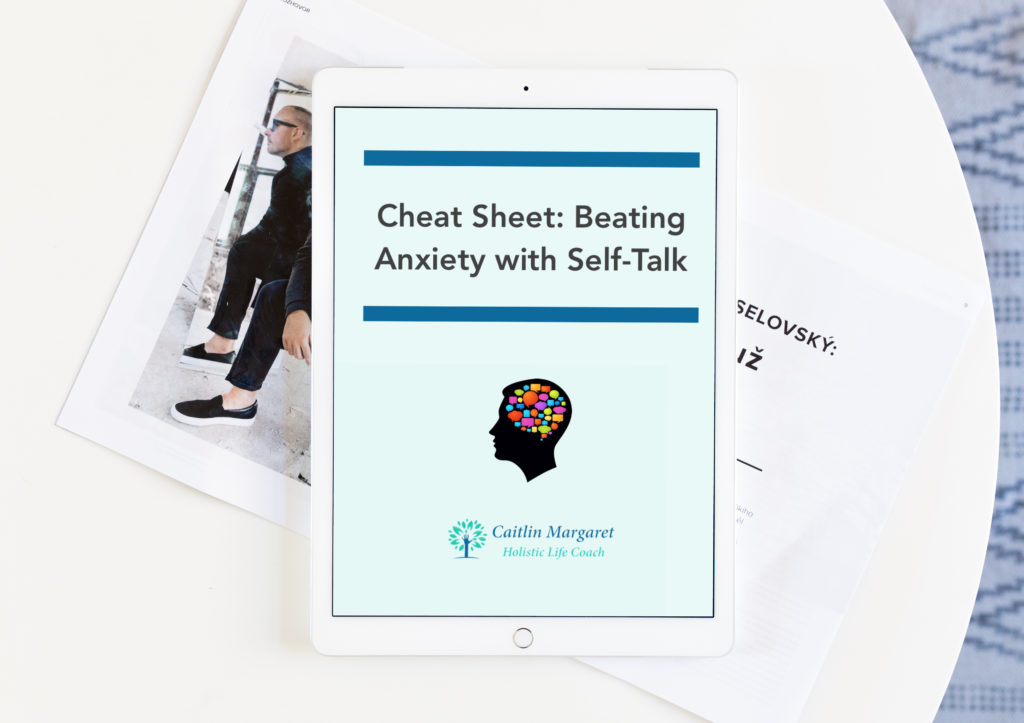If you’re having problems with anxiety and you go to a therapist for help, you’re likely to talk about your childhood, your self-confidence and the problems you’re experiencing in your everyday life.
Your therapist will probably teach you some healthy ways to cope with your anxiety. They’ll give you some strategies for letting go of old wounds and making peace with your current situation.
They might also recommend medication. But this is only a short term solution that can have severe and long-lasting side effects.
If you’re lucky, your therapist might also talk to you a little bit about your lifestyle—reminding you of the importance of getting enough exercise and sleeping for eight hours a night.
Free Live Training…
How To Calm Your
Racing Mind
5 steps I use to cure anxious clients (without medication!)
But that’s usually as far they go.
And while all of these tools may be helpful—some even necessary—to overcome anxiety, they don’t go far enough.
You see, your unique biochemistry also has a dramatic impact on how you experience anxiety, and knowing about what’s going on inside your body is key for holistic healing.
Even if anxiety is triggered by an emotionally traumatic event, it often sets off biochemical imbalances which, left untreated, can become the new normal in your body.
So, after the trauma has passed, the physical sensations of anxiety linger on—because your biochemistry has been so dramatically altered.
In other cases, feelings of anxiety start as a result of a biochemical imbalance. You experience the physical sensations of anxiety—heart racing, shakiness, stomach aches— and react to them with emotional stress.
Either way, anxiety becomes a mind-body experience each inextricably connected and influencing the other’s ability to heal.
So, no matter how it starts, it’s critical to understand your biochemistry and the fundamental role it plays in causing and managing your anxiety. Balancing your biochemistry sets the stage for effective emotional and psychological healing down the road.
To get started, you’ll want to do an extensive review of your diet as well as the many other factors, like hormonal imbalances, critical neurotransmitters levels, blood sugar levels, gut problems, food intolerances, and vitamin and mineral deficiencies.
These factors will give you tremendous insight into the link between your biochemistry and your anxiety, and will better tell the whole story of what’s going on in your body and mind.
Once you have an idea of your own unique biochemistry, you can address any imbalances or deficiencies with dietary interventions, lifestyle changes and natural supplements. By creating a balanced biochemistry, you’ll make enormous strides on the road to anxiety recovery.
The 3 most common biochemical imbalances
Whenever people come to my practice with anxiety issues, we discuss the onset and physiology of their anxiety, and explore the relevant biochemical factors that might be contributing to their problems.
Below are the three most common issues that I see:
- Vitamin B12 Deficiency
Vitamin B12 is one of the most commonly deficient vitamins in the U.S. Essential for the development of healthy red blood cells and proper nervous system functioning, it often manifests itself as anemia and neurologic dysfunctions.
If you aren’t getting enough vitamin B12, you might also experience pale or jaundiced (yellowish) skin, fatigue, shortness of breath, mouth ulcers and weakness.
Symptoms can show up in unexpected ways too. That feeling of pins and needles in your hands and feet or a loss of balance or general co-ordination could also be a sign you’re deficient.
For your body to properly absorb vitamin B12, it needs help from a protein known as intrinsic factor. So if you don’t have enough of this protein you may need B12 injections or higher doses of supplements.
And if you’re a vegetarian or vegan, you’re at an even greater risk, because a plant-based diet rarely provides enough B12.
What’s the link to anxiety?
Because Vitamin B12 is required for your nervous system to function properly, you can suffer from anxiety, panic attacks and depression if you’re not getting enough.
Recently, a 26-year old client came to me. She had been diagnosed with anxiety and depression when she was 13, and was taking four different prescription medications when I met her.
After blood tests, we found out she had low levels of B12. So we changed her diet and added supplements to get her levels back up to a normal range. We also did deep psychological work to help her to let go of the anxious identity she adopted over the years—as she now understood that she was not inherently an anxious person, just someone who had a vitamin deficiency.
Within three months, her anxiety vastly subsided, and for the first time in her adult life she was able to sleep soundly through the night.
She started feeling more hopeful and positive about life in general. And six months later she was off all her anxiety meds and said she felt better than ever—all from a simple B12 increase.
- Low GABA
You may not have heard of GABA yet, but it’s an important player in your ability to handle stress and even control negative thoughts.
GABA, or Gamma-aminobutyric acid, is a neurotransmitter that sends chemical messages through your brain and nervous system. Its role is to reduce the activity of the nerve cells, so it has a calming effect on the brain.
As a result, when you’re low in GABA, you can easily get overstimulated and anxious.
GABA deficiency symptoms can affect the whole body, and include IBS, acid reflux, sweaty hands, trouble sleeping and anxiety.
As it turns out, your stomach has a lot to do with your GABA levels, because it converts glutamine and glutamic acid into GABA. If your gut isn’t healthy, you might find yourself with a GABA deficiency.
So, if you find your GABA levels are low, you should explore whether gut issues could be playing a role. And in the meantime, you can begin to change your diet and take GABA-promoting supplements for some immediate relief.
A 35-year-old man came to me asking for help dealing with anxiety. For the first time in his life, he was having panic attacks.
Work had always been stressful, but suddenly he was completely overwhelmed. He couldn’t pinpoint the exact cause of his anxiety. It was next to impossible for him to relax and his muscles were often tense.
This kind of sudden onset of anxiety and panic attacks is often related to GABA, so we got his levels tested, and discovered he was way below normal. We created a long term plan for naturally balancing his gut, and used natural supplements to increase GABA in the short term. Within one week—you guessed it—his panic attacks completely stopped.
- High Cortisol
If you’re finding yourself tired, stressed and suddenly gaining weight even though your diet hasn’t changed, you may have high levels of the stress hormone cortisol. Your adrenal glands release cortisol as a natural response to stress or when your blood glucose level is low.
Sometimes, however, your body starts releasing too much cortisol, often due to unrelenting stress or extensive use of certain medications like birth control. When this happens, anxiety takes hold.
This is because high cortisol leads to many of the physical feelings associated with anxiety like jitters, nervous stomach, feelings of panic, and even paranoia.
If you’re exposed to intense stress for a continuous period of time, your adrenal glands will continue to pump out those high levels of cortisol and eventually adrenal fatigue sets in.
Think cortisol levels might be the cause of your anxiety? Look for signs like muscle weakness, more frequent colds and infections, trouble thinking clearly and high blood pressure. High cortisol can also cause bone loss that may lead to fractures over time.
After going through a tough break-up, losing her job and dealing with her mother’s fatal illness—all in a matter of months—a client came to me unable to handle the stress.
Understandably, she developed anxiety and was showing symptoms of high cortisol and adrenal fatigue. Her mind was constantly racing. She was always exhausted and emotional. She was frequently sick and her PMS was of control.
Testing revealed that her cortisol levels were through the roof, so we spent the next few months working together to naturally bring them into balance. Through a combination of lifestyle changes, dietary tweaks, and natural supplementation, she slowly made her way back to her old self, feeling optimistic and more equipped to handle stress.
Biochemistry is fundamental to healing anxiety
These stories give you some idea of how biochemical imbalances can trigger or worsen anxiety symptoms. Unfortunately, when these imbalances take hold of us, they often set off negative thought patterns and behaviors that kill our self-confidence. So it’s important to treat all of the factors [link to Holistic article]—not just physical symptoms, but mental patterns and behaviors that come about as a result.
The good news is that all anxiety symptoms—biochemical and otherwise—can be treated naturally, through changes in your diet and lifestyle, as well as herbal remedies. These natural solutions to anxiety are infinitely more powerful, healthy and longer lasting than any medication on the market today.
P.S. Are you ready to heal your worried mind once and for all – without any medication? Then sign up for my free upcoming live training: How To Calm Your Racing Mind: 5 steps I use to cure anxious clients. In it, I’ll cover the lifestyle, diet, meditations, and other powerful tools that will comprehensively dissolve your anxiety and guide you to the happiest version of yourself that you have ever known. But spots are very limited – so sign up now!
Cheat Sheet: Beating Anxiety with Self-Talk
Are you hijacked by your anxiety?
Constantly making mental lists of all the ways that you could fail – and all the things that might go wrong?
Use this Cheat Sheet to transform your negative thoughts into loving and constructive self-talk – so you can ditch your anxiety once and for all!





